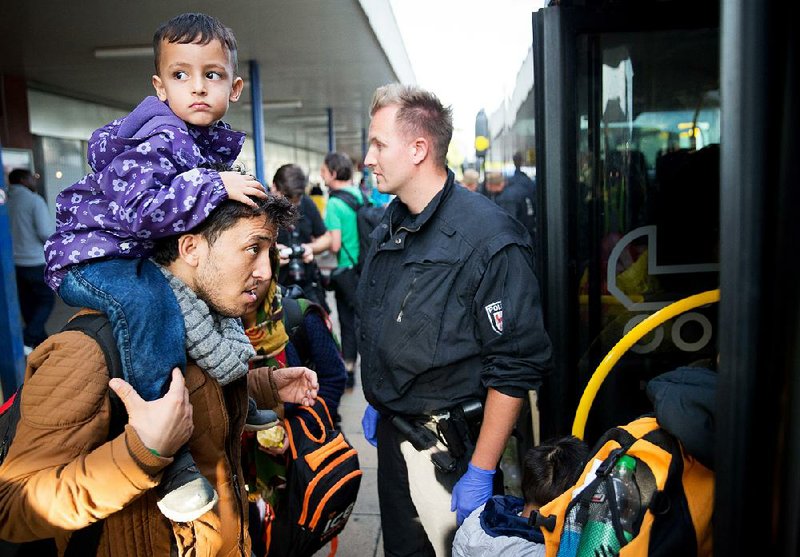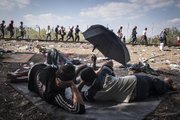BERLIN -- Germany announced Sunday that it was invoking emergency powers to start protecting its borders to stem the tide of thousands of refugees, sending a message to its European partners that it needs more help.
MORE TOP STORIES IN TODAY'S DEMOCRAT-GAZETTE
RELATED ARTICLE
http://www.arkansas…">Frantic refugees search for lost loved ones
With record numbers of migrants pouring across the Hungarian border and rushing west, Germany ordered temporary border restrictions on Sunday that cut off rail travel from Austria and instituted spot checks on cars.
It took the action just one day before European ministers were scheduled to meet in Brussels to discuss a plan to distribute tens of thousands of refugees across Europe, with many governments, particularly in eastern Europe, bristling at being forced to accept more migrants than they wish to take.
Germany is a preferred destination for many people fleeing Syria's civil war and other troubled nations in the migration crisis that has bitterly divided Europe. They have braved dangerous sea crossings in flimsy boats -- another 34 drowned Sunday off Greece -- and made long treks across unwelcoming countries in hopes of a better life.
Berlin has become increasingly frustrated with the reluctance of many other countries in the 28-nation European Union -- especially those in the former Eastern bloc -- to share the burden of hosting the newcomers.
"The aim of this measure is to limit the current influx to Germany and to return to orderly entry procedures," Interior Minister Thomas de Maiziere told reporters. "This is also urgently necessary for security reasons."
De Maiziere added: "The great readiness to help that Germany has shown in recent weeks ... must not be overstretched."
He did not specify how long the border controls would remain in place or how exactly incoming migrants would be handled, saying only that Germany will continue to observe national and European rules on protecting refugees.
Although one of the proudest European achievements of recent decades was passport-free travel between most member nations, the rules allow the reinstatement of border restrictions in cases of crisis and national security, he said. The European Commission said the crisis "appears to be a situation covered by the rules."
German officials didn't have further details, but in principle, border checks allow officials to turn back anyone lacking valid papers to enter.
The move, de Maiziere said, was also "a signal to Europe: Germany is facing up to its humanitarian responsibility, but the burdens connected with the large number of refugees must be distributed in solidarity within Europe."
Germany's national railway, Deutsche Bahn, said it had suspended service from Austria to Germany for 12 hours at the orders of authorities. Most new arrivals have come by train.
De Maiziere noted that Germany isn't technically responsible for most of the new arrivals, pointing to EU rules under which they are supposed to be registered and processed in the first EU country where they arrived. He urged other countries to apply those rules, and said people seeking protection cannot choose the country where they receive it.
He said Germany was reintroducing checks at its borders with an "emphasis" on the Austrian frontier. It wasn't clear whether there would be any change at other borders.
When word of the new restrictions made the rounds at the main station in Salzburg, Austria, the last major stop on the rail journey to Germany, hundreds of migrants were taken off the blocked trains and to a garage nearby, Deutsche Presse-Agentur said.
A simple sign was posted on the station's information boards: "No railway service by order of German authorities due to the German migrant crisis."
Czech Prime Minister Bohuslav Sobotka said Sunday that his country has boosted the police presence on the Austrian-Czech border in reaction to the German decision.
The government will assess the situation on a regular basis and will take further security measures if needed.
Also on Sunday, German Chancellor Angela Merkel spoke with Jean-Claude Juncker, president of the European Commission, who proposed a plan last week to relocate 160,000 migrants who are bottling up in the main front-line nations of Greece, Italy and Hungary.
The proposal, to be discussed today in Brussels by the bloc's home affairs ministers, includes 40,000 migrants covered under an earlier plan that collapsed when several member nations refused to accept mandatory quotas of migrants, as well as 120,000 more.
Leaders of several countries, including Poland and the Czech Republic, have said they still object to any mandatory quotas, but may be willing to accept more new arrivals as long as it is voluntary.
WAITING ZONES
In announcing Germany's new border restrictions, de Maiziere also called for the creation of what he called "waiting zones" along the union's external borders where migrants could be registered and wait until they were granted refugee status and assigned to a country.
Hungary's government, which has taken a hard line during the crisis, reacted warmly to Germany's announcement on Sunday.
"Hungary understands Germany's decision, and Hungary is standing by Germany," Peter Szijjarto, the country's foreign minister, said at a news conference.
He said Hungary welcomed Berlin's decision, which he described as defending German and European values, adding that Hungary made a new proposal of its own on Sunday: calling for a continent-wide effort to defend the borders of Greece, the first stop on the migrant path.
The migrants who eventually make their way to Hungary usually begin their journey into Europe with a short, but often perilous, sea crossing from Turkey to one of the nearer Greek islands.
If European leaders could close off that flow, Hungarian officials said Sunday, the numbers moving through the Balkans into Central Europe would dwindle to a trickle. Advocates for migrants say that those determined to reach Europe will only find other paths.
Just how dangerous that sea crossing can be was evident again Sunday when the Greek coast guard recovered the bodies of 34 migrants, including 15 children, after their boat capsized in the Aegean Sea.
An additional 68 were rescued, and 30 others managed to swim to the nearby island of Farmakonisi.
On Saturday, two other boats carrying asylum seekers capsized in the Aegean and at least five people -- four children and a 20-year-old man -- were presumed drowned.
The land portion of the journey offers dangers, too. Austrian authorities said they saved 42 people on Sunday from a refrigerated truck near the German border, and arrested two smugglers. Just last month, 71 people were found dead in the back of such a truck near the Austria-Hungary border.
Germany has said it expects 800,000 migrants by year's end, but has indicated up to now that it can handle the newcomers, and even welcomed their addition to its aging workforce.
But the numbers arriving have continued to grow, and Germany's humanitarian network is wobbling under the strain.
On Saturday, around 12,000 migrants arrived in Munich, with 4,000 more by Sunday afternoon. More beds are needed, Munich officials said.
And more migrants are on the way. Before Germany closed off rail traffic from Austria, Austrian officials said 500 migrants were arriving every hour at the main border crossing between Hungary and Austria, with 7,000 crossing that day before 3 p.m.
On the Serbian border, Hungarian authorities said that 4,330 migrants were detained Saturday for crossing illegally, an increase of 700 over the previous one-day record. And many thousands more are waiting to cross behind them, or making their slow way to the border.
CANDIDATE COMMENTARY
In the U.S., Republican presidential candidate John Kasich said Sunday that he supports President Barack Obama's plan to admit at least 10,000 Syrian refugees over the next year.
"It's very important that we don't let anybody infiltrate who's part of a radical group," Kasich said. "But America needs to be part of this solution."
The U.S. also could provide logistical support and humanitarian aid, Kasich said.
The prospect of increasing asylum seekers has been a delicate issue for U.S. politicians. Republican candidate Donald Trump has said he reluctantly agrees that the U.S. needs to try to help. "I hate the concept of it, but on a humanitarian basis, you have to," Trump said Sept. 1.
Information for this article was contributed by Melissa Eddy, Rick Lyman and Alison Smale of The New York Times; by Geir Moulson, Shawn Pogatchnik, Pablo Gorondi and Demetris Nellas of The Associated Press; and by Ian Katz of Bloomberg News.
A Section on 09/14/2015


